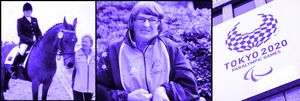Australian dressage Athens 2004 silver medallist Jan Pike sets out what you need to climb the Paralympic mountain.
As Jan Pike entered the stadium for the Opening Ceremony of the Athens 2004 Paralympic Games, surrounded by fellow Australian athletes and the cheers of "Aussie, Aussie, Aussie!", she was overwhelmed with a pride she had never before experienced.
It was one of the best moments of her life, made even sweeter when she went on to win two medals in Paralympic equestrian competition with her horse Dr Doulittle – silver in the individual championship dressage GI and bronze in the freestyle dressage GI events.
"Representing your country is probably one of the most special and rewarding feelings that anyone can have," Pike said. "I consider myself to be very lucky to be able to have that experience."
In the 17 years since she won silver and bronze, Pike has become a fierce advocate for people with disabilities, particularly through her work with Riding for the Disabled and as a representative for riders. In June, she was awarded an Order of Australia Medal for her advocacy.
'Just try to beat yourself … there's only one way to the top and that's perseverance, determination and a hell of a lot of courage.'
With the Tokyo 2020 Paralympics starting on Tuesday, August 24, Pike is concerned that Paralympians are still overshadowed by their able-bodied counterparts. There is less media attention and less engagement from the public but interest is growing. The most recent Paralympics in Rio di Janeiro broke records with an estimated 4.1 billion cumulative viewers, up from 1.8 billion viewers 12 years earlier when Pike competed at Athens 2004.
She acknowledges that attitudes towards the Paralympics are beginning to change but there is still a lack of awareness and recognition and she says it remains harder for Paralympians to make a career out of their sports than for able-bodied athletes.
"Paralympians themselves are more outspoken and they're getting more opportunities to actually explain that what we do is equivalent to what the Olympians do," she said. "But I don't think it's changed enough. As far as things like funding, we don't get anywhere near the funding that the Olympians get and the sponsorship opportunities."
Paralympians also have a different set of support needs: each athlete needs support staff, specialised sporting equipment and faces issues of what medication they can legally take.
The impact of that lower level of support for and representation of Paralympic athletes can be seen at university level. For example, while UNSW has supported individual Para-athletes there is no specific program for disabled athletes.
UNSW Elite Athlete Manager Helen Bryson said: "There's a lot more support out there, there's still a long way to go in terms of funding and I think at university level we definitely can do more." She explained there were no specific programs because "we don't have the numbers in sport".
For Pike, becoming a Paralympic silver medallist gave her a platform to speak out. Her advocacy focuses on mentoring young people with disabilities, particularly disabled riders. She works as an executive officer with Riding for the Disabled, an organisation which provides therapeutic and recreational horse riding to people with disabilities, such as cerebral palsy, which Pike herself has lived with since birth.
"I've always been a strong advocate for acceptance and awareness for people with disabilities in the general community, so I guess the Paralympics gave me an additional forum to be able to advocate," Ms Pike said.
"I mentor a lot of young people, particularly with cerebral palsy…sometimes you can speak more openly to someone with a disability that has that life experience," said Pike.
"My main role now is encouraging people to live the fullest life they can … and not to look at what they can't do but focus on how they can adapt."
Her advice for Australia's Paralympians heading for Tokyo 2020? "Just try to beat yourself … you've got to have tunnel vision, and there's only one way to the top and that's perseverance, determination and a hell of a lot of courage."
